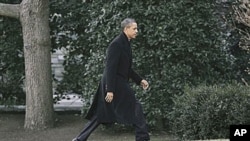President Barack Obama is calling on Egypt’s leaders to explain the changes they plan, and how they will lead to democracy. Mr. Obama is making his strongest statement yet about the situation, but stops short of demanding that Egyptian President Hosni Mubarak step down.
President Obama issued a four-paragraph written statement late Thursday, calling for greater clarity from Egyptian President Hosni Mubarak and Vice President Omar Suleiman.
The statement begins by saying, "The Egyptian people have been told that there was a transition of authority, but it is not yet clear that this transition is immediate, meaningful or sufficient."
It then says "too many Egyptians remain unconvinced that the government is serious about a genuine transition to democracy."
Mr. Obama calls on the Egyptian leaders to "put forward a credible, concrete and unequivocal path toward genuine democracy", and says they have not yet seized that opportunity.
The president also insists that Egypt’s emergency law, in effect for almost 30 years, be lifted.
The statement does not demand Mr. Mubarak’s resignation or mention him by name.
The White House issued the statement after President Obama met with his national security team about the situation in Cairo.
Early Thursday, the Obama administration was receiving indications that President Mubarak would step down.
On a visit to the north central city of Marquette, Michigan, Mr. Obama said the world is watching history take place as the Egyptian people demand change. And he said the United States will support efforts toward democracy in whatever way possible.
"And so going forward, we want those young people and we want all Egyptians to know America will continue to do everything that we can to support an orderly and genuine transition to democracy in Egypt," he said.
Mr. Mubarak later infuriated the crowd in Cairo’s Tahrir Square by refusing to leave office while saying he was transferring powers to Vice President Omar Suleiman.
Later, Egypt’s ambassador to the United States told CNN Suleiman is now the de facto president of Egypt, with all executive powers of the presidency.
Mr. Mubarak blamed foreign influences, in part, for fueling the anti-government protests.
Mr. Obama’s statement calls on the Egyptian government to "move swiftly to explain the changes that have been made, and to spell out in clear and unambiguous language the step-by-step process that will lead to democracy and the representative government that the Egyptian people seek."
The president also insists that the Egyptian people’s universal rights be respected, and that violence be avoided.
Mr. Obama concludes the statement by saying the Egyptian people will continue to have a friend in the United States.
Obama: Unclear How Latest Egypt Government Moves Will Bring Change

